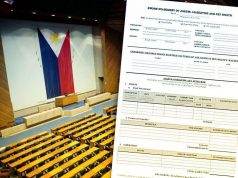Trying to understand Trump and Duterte loyalists
I came upon an interesting article entitled, “A Complete Psychological Analysis of Trump’ Support,” which attempts to explain the reportedly near-fanatical loyalty to President Donald Trump of his Republican voter base.
The article, written by Bobby Azarian, PhD, which came out in Psychology Today. Correctly states, “While dozens of psychologists have analyzed Trump, to explain the man’s political invincibility, it is more important to understand the minds of his staunch supporters.”
The article then cites the analysis of various psychologists to come up with 14 factors that would explain why many Trump supporters would ostensibly “follow Trump off a cliff,” adding that these are people “who will stand by (Trump’s) side no matter what scandals come to light, or what sort of evidence for immoral and illegal behavior surfaces.”
Interestingly, many of the 14 factors also apply to President Rodrigo Duterte’s rabid followers:
The first factor is “1. Practicality Trumps Morality.” According to the article, “For some wealthy people, it’s simply a financial matter. Trump offers tax cuts for the rich and wants to do away with government regulation that gets in the way of businessmen making money, even when that regulation exists for the purpose of protecting the environment,”
If that sounds familiar to Filipinos, it is because in the Philippines money buys loyalty — and this applies to every president and every politician, civil servant and businessman. For all of Duterte’s bluster about getting rid of crooks, he hasn’t done much to “drain the swamp” the way Trump vowed he would do (but hasn’t done — even making the swamp murkier).
Vote-buying is SOP in Philippine elections and those who complain the loudest about it are often the most vulnerable to selling their votes.
The Psychology Today article continues: “…people have put their practical concerns above their moral ones. To them, it does not make a difference if (Trump) is a vagina-grabber, or if his campaign team colluded with Russia.”
However, the article adds: “It is unknown whether these people are eternally bound to Trump in the way others are, but we may soon find out if the Mueller investigation is allowed to come to completion.”
In other words, if the Special Counsel provides proof that Trump conspired with the Russians, will his voter base still remain loyal to him?
I will venture a guess that if it is proven that Duterte has conspired with the Chinese to slice off parts of the Philippines, his rabid supporters will not waver in their support. In the Philippines, the saying is, “He may be a crook, but he’s our crook.” One is also expected to be loyal to one’s leader or party mate, right or wrong.
The second and third factors cited in the article are:
“2. The Brain’s Attention System Is More Strongly Engaged by Trump” and “3. America’s Obsession with Entertainment and Celebrities”
The article cites a study that monitored brain activity while participants watched 40 minutes of political ads and debate clips from the presidential candidates. The study noted Trump’s “unique ability to keep the brain engaged. While Hillary Clinton could only hold attention for so long, Trump kept both attention and emotional arousal high throughout the viewing session. This pattern of activity was seen even when Trump made remarks that individuals didn’t necessarily agree with. His showmanship and simple language clearly resonate with some at a visceral level.”
On the “entertainment” and “celebrity” factor, the article notes: “Essentially, the loyalty of Trump supporters may in part be explained by America’s addiction to entertainment and reality TV. To some, it doesn’t matter what Trump actually says because he’s so amusing to watch. With the Donald, you are always left wondering what outrageous thing he is going to say or do next. He keeps us on the edge of our seat, and for that reason, some Trump supporters will forgive anything he says. They are happy as long as they are kept entertained.”
This also applies to Duterte. Duterte’s language is down-to-earth and resonates with his listeners. He has the ability to keep his audience engaged, even getting women to cheer him on in spite of his bastos language. Duterte’s bluster and hyperbole, like Trump’s, also appear to be taken as “part of his character” and therefore “tolerable” — even “forgivable.” In fact, even “amusing and endearing.”
The fourth factor (“4. Some Men Just Want to Watch the World Burn”) isn’t unique to either Trump or Duterte. There are people who were to the devil born who simply dislike the establishment. Their support of Trump (and, conceivably, of Duterte) is simply a support for the anti-establishment, as both candidates portrayed themselves when they ran for president.
Of course, it has since been revealed that both Trump and Duterte are no different from the typical politicians. Mostly bluster, hot air and “me first.”
The fifth factor (“5. The Fear Factor: Conservatives Are More Sensitive to Threat”) seems to apply mainly to Republicans (who are usually conservatives), According to the article, “A 2008 study in the journal Science found that conservatives have a stronger physiological reaction to startling noises and graphic images compared to liberals” and to perceived threats. For instance, the election of Barack Obama as the first black US president was seen by the whites as a threat to their “special status” in America.
This factor hardly applies to Duterte, Philippine politicians and Pinoy voters who have no ideology except the ideology of power and money.
The sixth factor (“6. The Power of Mortality Reminders and Perceived Existential Threat”) is common to every homo sapien. Says the article: “Terror Management Theory predicts that when people are reminded of their own mortality, which happens with fear mongering, they will more strongly defend those who share their worldviews and national or ethnic identity, and act out more aggressively towards those who do not…thoughts of death tend to shift people towards the right.” Of course, fear-mongering is a favorite tactic of both Trump and Duterte (i.e, the fear of immigrant-terrorists, drug users and pushers), and this has generated support for them.
The seventh factor (“7. The Dunning-Kruger Effect: Humans Often Overestimate Their Political Expertise”) applies to both Trump and Duterte supporters at the lower economic levels, but even the so-called intelligentsia can get confused by trolls and purveyors of fake news. At any rate, disinformation is a favorite tool of Trump and has been used by Duterte, as well as by all politicians.
The eighth, ninth, tenth, eleventh, twelfth and fourteenth factors (“8. Relative Deprivation — A Misguided Sense of Entitlement;” “9. Lack of Exposure to Dissimilar Others;” 10. Trump’s Conspiracy Theories Target the Mentally Vulnerable;” “11. Trump Taps into the Nation’s Collective Narcissism;” “12. The Desire to Dominate Others;” and “14. Racism and Bigotry”) apply mainly to white Trump supporters, mostly below college level, who believe they are entitled to “special status” and are being “deprived” by immigrants. This does not apply to Pinoys except the poor who know they have no special status and they are routinely being deprived by the rich and powerful. One reason for supporting Duterte.
The thirteenth factor (“13. Authoritarian Personality”) applies as much to Duterte supporters as it does to Trump loyalists. According to the article, this personality “is characterized by belief in total and complete obedience to authority. Those with this personality often display aggression toward outgroup members, submissiveness to authority, resistance to new experiences, and a rigid hierarchical view of society. Authoritarianism is often triggered by fear, making it easy for leaders who exaggerate threat or fear monger to gain their allegiance.”
One factor that the Psychology Today article may not have considered concerning Trump’s political “invincibility” is that most Americans do not regard him as either invincible or competent. The latest polls show that 57% of Americans disapprove of his performance. But the article hits the mark when it comes to Republican voters because 88 percent still support him, in spite of the government shutdown.
And what about Duterte? The latest surveys tell us that he remains the most trusted public official in the country.
Try to analyze that!
Greg B. Macabenta is an advertising and communications man shuttling between San Francisco and Manila and providing unique insights on issues from both perspectives.
gregmacabenta@hotmail.com



